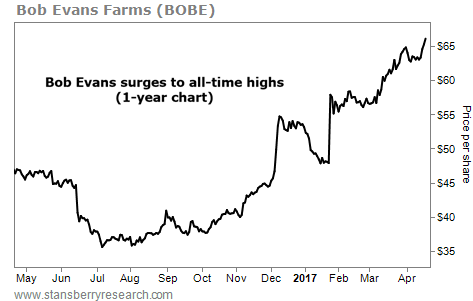| Home | About Us | Resources | Archive | Free Reports | Market Window |
This Trade Changed 400 Years of History in Just Four HoursBy
Friday, April 21, 2017
On a cold and rainy day in October 1971, Ray Tomlinson sent the first-ever e-mail.
At the time, he didn't think much of it. Nobody told him to do it... He just thought it was neat.
Tomlinson was a programmer working on a secret government project called ARPANET... a network of computers that could "talk" to one another.
It took two years before people realized just how powerful Tomlinson's invention was. By then, e-mail had gone from virtually nothing to 75% of all ARPANET traffic.
Today, 2.5 million e-mails per second are sent on ARPANET's successor – the Internet.
More than four decades after Tomlinson's invention, e-mail is still the single most-used application on the Internet. It was crucial to the growth of the web.
In the early days of the Internet, e-mail was the primary draw for users. There was no YouTube, Google, or iTunes Store.
E-mail birthed some of the earliest Internet success stories... Pioneering online-service providers like Prodigy, CompuServe, and America Online were all built on providing convenient e-mail access.
E-mail has been called a "disruptive technology." Its use is so widespread that it's putting the U.S. Postal Service out of business... E-mail has contributed to a 35% drop in first-class mail over the past decade.
Early investors in e-mail support technology got rich, turning tiny investments into millions and millions of dollars today.
It's easy for us to dream what it would have been like to make that sort of fortune from an investment. If we had the right information back in the 1980s and 1990s, would we have invested? Would we have committed those dollars?
Today, I'm putting your feet to the fire.
Friends, we are on the brink of a budding new technology trend that is on the same scale as e-mail and the Internet – possibly bigger. But this one will revolutionize the way we transact and do business... in the way e-mail revolutionized communication.
It's happening right now with only a few people watching...
On September 7, Barclays facilitated a $100,000 trade of cheese and butter between Irish food company Ornua and the Seychelles Trading Company.
This small trade will be just as revolutionary as the first e-mail sent.
Here's why...
When two companies in different countries want to buy and sell from each other, they use a bank to guarantee the transaction... It's called "trade finance."
According to consulting giant McKinsey, about $2 trillion is conducted in trade finance each year.
For more than 400 years, trade finance hasn't changed much. Banks act as intermediaries between trading partners. They use letters of credit to guarantee everyone gets paid. Part of the due-diligence process has always involved collecting a mass of paperwork.
Both sides have to prove that they truly own what they say they own. They also have to prove that the goods they are selling are of the size, quality, and quantity that the bank is guaranteeing.
As you can imagine, trade finance involves sending mounds of paperwork across oceans. Missing a signature? Sorry, please resend the package. It's a time-consuming process desperately in need of change.
Even in today's digital age, it takes 10 days on average just to handle the paperwork. Sometimes, it can take up to a month.
But all of that just changed on September 7.
That $100,000 trade for butter and cheese concluded in less than four hours. That's a huge time-saver that will significantly reduce the price of international trade.
Here's how the deal was done...
Barclays Bank used a new technology called the "blockchain" to transact the trade.
The blockchain is a digital ledger that is tamper-proof. No single party has the power to change the records. Instead of sitting in one central location, the ledger lives on thousands of computers that automatically update.
The blockchain also has a built-in electronic record-keeping and transaction system. Both trade parties are able to track all documentation via a secure network. That means no third-party verification is required.
Barclays' global head of trade and working capital, Baihas Baghdadi, said that the blockchain will be a game changer:
Think about that for a second... Trade finance hasn't changed since the 1600s. More than $2 trillion a year is conducted via trade finance, and it's still done with bits of paper flying across the world's oceans.
The first-ever trade deal done exclusively on the blockchain is as big as Ray Tomlinson's first e-mail.
It's a whole new way to do business. In a few short years, most international trade will be conducted through a blockchain... just like most of the world's communication is done via e-mail.
But the blockchain won't only change trade... Think about real estate. Real estate transactions have been done basically the same way since the Middle Ages. It's a cumbersome, paperwork-heavy process that takes months.
In a few years, the blockchain will allow you to qualify for a loan, conduct a title search, and close on a house in a single day. It's not that far off.
It's not every day you get to see a life-changing trend happen right before your eyes.
In a few short years, the word "blockchain" will be as commonplace as e-mail. And it will spawn entire new industries.
Barclays has proven the blockchain works to conduct business... And it won't take long before this technology becomes widespread. Remember, e-mail took off just two years after its first use.
But here's the thing... The technology is run using cryptocurrencies such as bitcoin. You can use cryptocurrencies to protect your wealth and privacy... But they also act as "shares" in the burgeoning blockchain industry.
As more people use the blockchain, these "shares" increase in price. Unlike hedge funds that require you to be an accredited investor (with a net worth of more than $1 million), you can buy "shares" in a blockchain's technology by purchasing its cryptocurrency.
Regards,
Teeka Tiwari
Further Reading:
"After missing out on so many long-term winners, I became determined to learn a method that would help me hold on to them longer," Teeka writes. He found that two simple traits can help you identify your "superstar" stocks... the ones you should ride all the way to the top. Learn more here: Follow These Two Rules to Hold on to Your Long-Term Winners.
Steve recently shared another huge opportunity setting up in the markets. The last time this happened, one group of stocks soared triple digits... Now, the uptrend is starting again. Learn more about this extreme setup right here: We Saw 400% Gains the Last Time This Happened.
Market NotesHOW TO KNOW IF YOUR INVESTMENTS ARE WELL MANAGED Today's chart highlights a business that's focusing on its profits...
Bob Evans Farms (BOBE) is a $1.3 billion company that operates more than 500 family restaurants. It's also a leading producer and distributor of sausage and bacon, as well as refrigerated and frozen foods. Recently, the company made a big shift... In January, it sold its restaurant business to focus on its packaged-foods division. It also purchased Pineland Farms Potato Company, which will give it more access to raw materials at lower costs.
These decisions are all about profitability. Bob Evans' restaurant business earns around 3%-4% operating profits on its sales. But its packaged-food business earns nearly 17%. Management is wisely choosing to ditch the low-margin restaurant business and focus on what works.
Investors applauded the deal... As you can see in the chart below, BOBE shares are up nearly 40% since the sale was announced, and they just hit a new all-time high. Focusing on profits is often a sign that management is making the right moves. And in this case, it has pushed this stock to never-before-seen levels...
 |
Recent Articles
|



